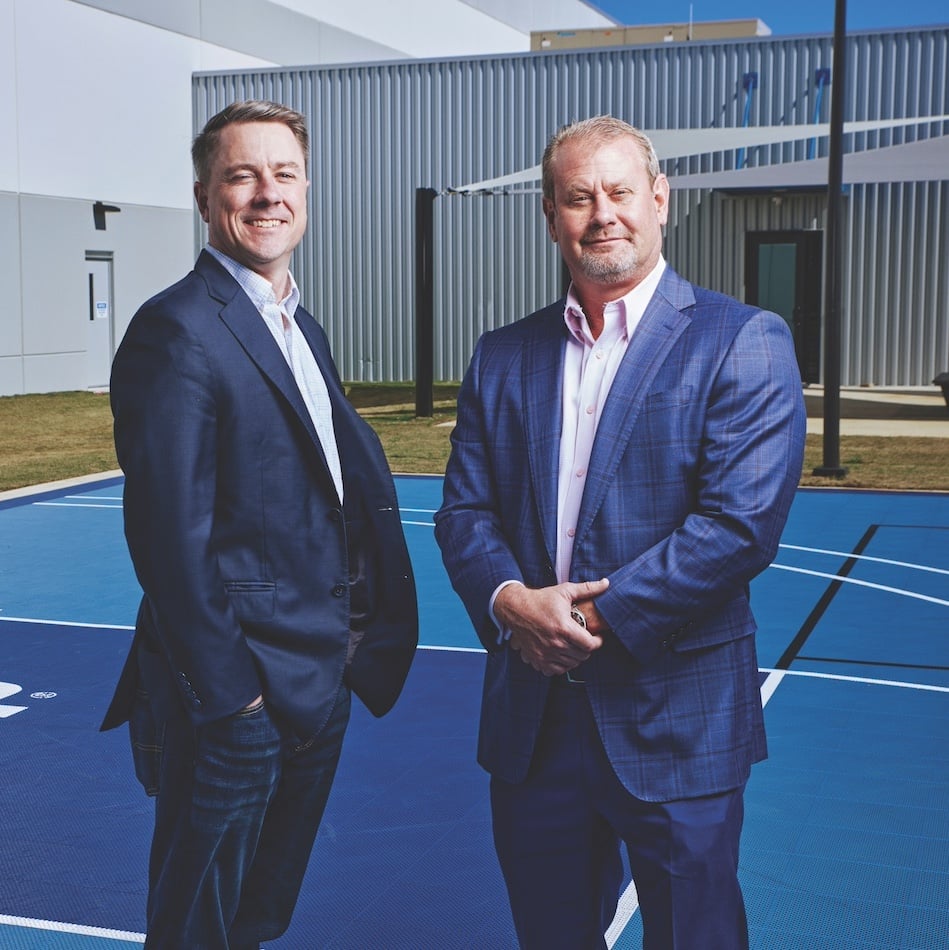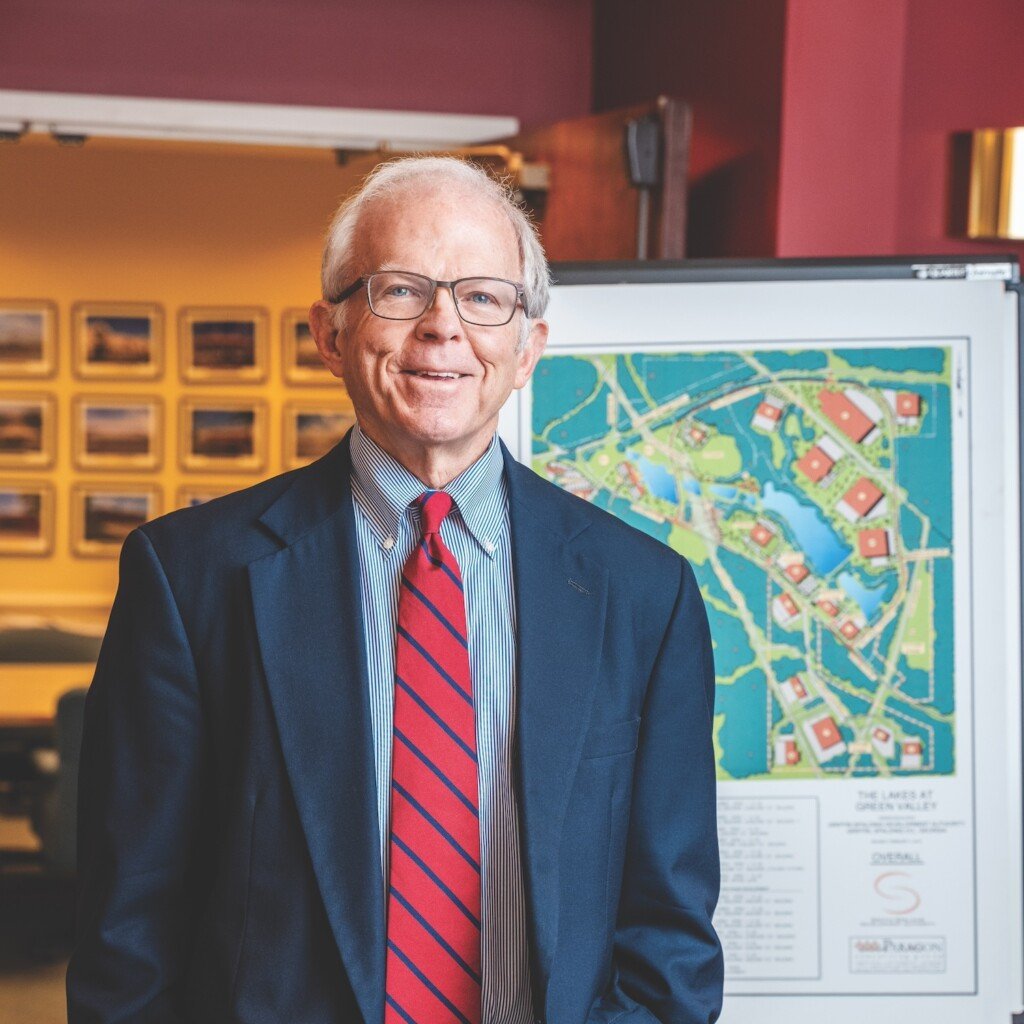Southwest Georgia: Working in Harmony
Agriculture, Manufacturing, Growth
Southwest Georgia has long been known for the production of pecans, peanuts and cotton, and the tremendous contribution of its agricultural industry to the economic success of Georgia. But new and perhaps unexpected things are happening here, too.

Jobs and Investment: Grant Buckley, executive director of the Cordele-Crisp County Industrial Development Authority, at CTS Cement Manufacturing Corporation’s new facility. Photo credit: David Parks
“We announced at the end of 2023 that Walmart is building a milk-processing facility here,” says Andrea Schruijer, former executive director of the Valdosta-Lowndes County Development Authority, who stepped down in October to take a job in private industry. “It’s a $350 million investment that will create 390 jobs.”Walmart chose Valdosta because of its proximity to dairy farms in Georgia and Florida, and the location advances the company’s commitment of building a more resilient supply chain, Schruijer says. The Lowndes County location is the company’s second milk-processing facility; the first opened in Fort Wayne, Indiana, in 2018.
Expected to open in late 2025, the new milk-processing facility will provide products for sale in more than 750 Walmart stores and Sam’s Clubs in the Southeast. It’s not the only recent Walmart investment in the region: In 2020, Walmart opened a facility as part of its Angus beef supply chain in Thomasville, which created more than 200 jobs.
“Obviously it’s great when you have a Fortune 500 company come into your community,” Schruijer says. “They are great corporate citizens and contribute greatly to the local economy.”
In another major economic development investment, a second furnace at Arglass, a glass container production company, is expected to be operational next year. The $230 million expansion will produce up to eight glass container types simultaneously and more than 350 million sustainable glass containers annually.
 “Arglass announced in 2019 that they would build their first manufacturing facility in North America in Valdosta,” Schruijer says. “The first facility created 150 jobs and represented $150 million in capital investment. When they did their site selection, they liked the community and available resources. We have sand here that is ideal for making glass.”
“Arglass announced in 2019 that they would build their first manufacturing facility in North America in Valdosta,” Schruijer says. “The first facility created 150 jobs and represented $150 million in capital investment. When they did their site selection, they liked the community and available resources. We have sand here that is ideal for making glass.”
Valdosta’s proximity to I-75 and CSX Class 1 rail connections also contributed to the city’s selection, she says. The city’s easy access to major highways and railways was also cited among the reasons GAF, a Standard Industries company and North America’s largest roofing and waterproofing manufacturer, purchased 130 acres of land in 2022 to build a plant that will eventually employ 135 people. Production started in September.
Meanwhile, in May the development authority announced P&B Cold Storage would be building a 200,000-square-foot cold storage facility in the Westside Industrial Park, bringing another 100 jobs to the community. Scheduled to open next year, the facility will store and distribute frozen goods to Publix stores in the Southeast, Schruijer says.
“When those type of companies locate here, they offer higher wages and full benefits packages, and that’s good for the citizens of the community and the region,” she says. “Over the last four years we’ve had 1,431 jobs created and $996.3 million in capital investment.”
Served by Rail

Transportation Advantages: Lisa Collins, executive director of the Cook County Economic Development Commission. Photo credit: David Parks
Logistics matter. The city of Cordele is located on I-75 with direct rail service. Cordele boasts two Class I railroads (Norfolk Southern and CSX) that run through the city north to south and one short line (Genesee and Wyoming, Inc.) that runs east to west, notes Grant Buckley, executive director of the Cordele-Crisp County Industrial Development Authority.
“Between the three railroads, we estimate that 60 trains per day cross Cordele,” he says. “We’re blessed as a community with a rail-served industrial site. Projects that utilize rail are typically good projects, typically in the manufacturing industry, and what I’m hearing from my statewide development friends is that industrial rail sites are becoming [scarcer] across the country.”
Transportation advantages were also top of mind in Adel and Cook County in 2024. Funded with $3.3 million in Transportation Special Purpose Local Option Sales Tax (TSPLOST) revenue, phase 1 of the Alabama Road project on the east side of the city has already attracted a new Starbucks and Circle K, with more retail expected to follow, according to Lisa Collins, executive director of the Cook County Economic Development Commission. Phase 2 of the project is underway and when complete, the road will allow travel from state Route 37 to state Route 76 without going through downtown, which will be more convenient for large truck transport. Also funded through TSPLOST, phase 2 has a price tag of about $4.5 million.
The rail access contributed to successes: Two expansions and one new company were added to the city’s economic development roster in the last year, all in manufacturing, Buckley says.
“These are base hits, not grand slams,” he says, “but when you total the jobs of all three of those, you come up with about 100 jobs and an investment of $78 million.”
A growing labor force and a rise in median household income are additional measures of a healthy local economy, Buckley says. The Crisp County labor force grew by 16% from 2016 to 2024, and there was a 41% increase in median household income from 2015 to 2022, according to Buckley.
“Historically, we’re not a wealthy community, but that increase exceeds inflation, so it’s real, and I’m happy to see it because that standard of median household income is the industry standard for retail as to whether a market fits for their income standards,” he says.
New Partnership

Great Success: Lisa Davis, executive director of the Lee County Chamber of Commerce, with Ciao Ciao pizza dough. Photo credit: David Parks
Thirty-nine miles southwest of Cordele, Albany is another regional hub for healthcare, retail, education and employment. Downtown redevelopment, a new living and learning community aimed at addressing the critical need for more nurses in the region and beyond, and new and expanding industries are among the highlights of what’s happening in Dougherty County.
Also making headlines is a new partnership that’s growing the film industry in the community, says Jana Dyke, president and CEO of the Albany-Dougherty Economic Development Commission.
“We have partnered with the Kendrick brothers, who make Christian films,” she says. “They’re from Albany and we partnered with them on a movie called The Forge, which was filmed in Dougherty County in its entirety, and it was released nationwide August 23, [2024].”
What made this production different, however, is that all the post-production work was done locally, Dyke says.
“In the past they’ve had to go to other communities that had studios to complete the film, but they were able to do not only the filming but the post-production in Dougherty County, too,” she says. “About a year ago, they set up a studio in Dougherty County.”
Once seen as a bedroom community for Albany and Dougherty County, Lee County and its county seat of Leesburg are “starting to grow and be a little less that,” according to Lisa Davis, executive director of the Lee County Chamber of Commerce.
“A lot of our growth is because Albany is building out in this direction,” she says. “We definitely are growing retail- and commercial-wise, and we’re having some great success with that right now.”

Georgia Film: The Kendrick Brothers, filmmakers who live in Albany, shot and produced The Forge in Dougherty County. Photo credit: contributed
Commercial and retail growth notwithstanding, the local economy continues to be dominated by the agricultural industry, Davis says, noting the chemical and fertilizer companies located in the county’s lone industrial park, Oakland Meadows.
The industrial park’s newest resident, however, has nothing to do with agriculture. It’s a food manufacturer – specifically pizza dough.
“Two young men had several businesses in Albany – a catering business, a hotel and two or three restaurants – and one of their restaurants was an Italian restaurant, and the chef was Italian and made his own pizza dough,” Davis explains. “So these very successful entrepreneurs decided to try manufacturing that pizza dough.”
In the beginning, Ciao Ciao pizza dough was only sold in Las Vegas and California, but now it’s sold nationally because the company has a distributor, and the manufacturing facility is running two shifts a day, Davis says.
County Collaboration
In addition to the organic growth that’s happening, Davis credits Locate South Georgia with contributing to the community’s success. Locate South Georgia is a 23-county collaboration that markets the region, courting agribusiness, distribution and logistics, manufacturing and bioscience industries.
Vice Chair Rick McCaskill, who also serves as executive director of the Development Authority of Bainbridge-Decatur County, says the group is “really working well,” but that wasn’t always the case.
“For the longest time we had a hard time looking outside our own boundaries, and we’ve really started doing that, and there’s a much stronger sense of working together,” he says. “When one community doesn’t have something an industry is looking for, but another one does, we share leads. For the first time ever we’ve all embraced that.”
An emphasis on marketing, including an annual bus tour for Atlanta area economic development professionals, is also paying dividends, McCaskill says.
“A lot of them have never been exposed to anything below Macon,” he says. “We’ve done a good job marketing our whole region and we’ve had some successes come out of that as well.”
Bainbridge Buzz
Whether the result of Locate South Georgia’s marketing efforts, regional referrals or a matter of momentum, McCaskill says Bainbridge has had the “hot hand” for a while.

Activity Breeds Activity: Rick McCaskill, executive director of Bainbridge-Decatur County Development Authority, in front of Georgia’s first Rural King. Photo credit: David Parks
“Every industry we’ve got is expanding,” he says. “Anovion is coming in and there are major expansions happening at Harrell Ag Products, Steward Machine and A-1 [Industries wood] trusses. I think activity breeds activity. We’ve just had so much activity people are looking at us and asking, ‘What’s going on in Bainbridge?’”
In May 2023, it was announced that Anovion would invest $800 million to build a 1.5-million-square foot facility to produce synthetic graphite for use in batteries that power EVs, electric storage systems, electronics, military applications and other products. The facility, located in the Downrange Industrial Park, will be the first of its size and scale in North America and is expected to be operational late next year.
In August, local leaders attended the groundbreaking for a new Publix shopping center, right behind Chick-fil-A.
“Just that announcement alone has created a ton more retail inquiries,” McCaskill says. “People get more excited about the Chick-fil-A and Publix than they do about anything else.”
Also new to town is Georgia’s first Rural King, a hardware, farm supply, sporting goods and gun store, which will be joined by a Wawa gas station and convenience store, also one of the state’s first, according to McCaskill.
All of this opportunity doesn’t come without its challenges, however, and just like many other communities across the state, Bainbridge is struggling to meet the community’s workforce housing needs.
“We’ve had a lot of jobs created over the last few years, so we’ve been a little bit behind on housing,” McCaskill says. “There’s a concerted effort to get more homes.”
A national homebuilder, DR Horton, is building more than 200 homes in the area, McCaskill says.
“The first 40 to 45 homes are up,” he says, “and they’re pouring new foundations every week.”
Housing and Jobs

Hot Hand: The Rock N’ Root Rake, which clears land and preserves topsoil, is made by Harrell Ag Products, one of the growing industries in Bainbridge. Photo credit: contributed.
For Shelley Zorn, executive director of the Thomasville-Thomas County Payroll Development Authority, housing has become a top priority in economic development.
“In the last two years, I’ve worked more on housing and with housing developers than I have the previous 20 years,” she says. “I have prospects asking about housing and that is part of the deal now. It’s become a hot topic.”
To address the shortage of workforce housing in the area, Zorn says there are three new apartment complexes and seven new subdivisions in Thomas County. Residents are getting jobs in new and expanding businesses and industries.
“I am tasked with two main priorities, and first and foremost is visiting our existing industries and monitoring how they’re doing,” she says. “Over the last five years, 957 new jobs were created in existing industries with $45 million in investment. We always want to recruit and welcome new industries, but we want to make sure we’re keeping the ones we have.”

Marketing the Region: Shelley Zorn, executive director of the Thomasville-Thomas County Payroll Development Authority, at Check-Mate Industries. Photo credit: David Parks.
Among the existing industries expanding locally is Ag Pro, the corporate office for John Deere dealerships in the U.S. According to Zorn, the company has expanded twice in the last five years, creating about 75 new “well-paying corporate jobs.” Ag Pro created another 50 jobs earlier this year when it began production in Thomasville of some John Deere products sold in its dealerships, she says.
“Also on the local side is Ashley’s [Furniture] distribution center, which has been here forever, but they built a new building in the industrial park [bringing] 105 new jobs and $20 million investment,” Zorn says. “On the new investment side, which is the other half of my job, we’ve had the announcement of Troy Acoustics, a $57 million investment and 166 new jobs.”

Big Investment: Ashley Furniture built a new distribution center in the Red Hills Business Park in Thomas County. Photo credit: contributed.
Troy Acoustics makes acoustical panels for housing, gun ranges, movie theaters and spas. Another recent addition to the local economy is the U.S. headquarters of Ecrimesa, a Spanish-based company that makes small metal parts for guns.
“Ecrimesa invested $5 million and will create about 50 new jobs to start phase 1,” says Zorn, who also serves as chair of Locate South Georgia. “When I market Thomasville I very much market the region because that’s our workforce. We’re a county of 45,000 people, but we’re able to market the region and that includes five surrounding Georgia communities and Tallahassee, Florida, so we’re able to market a 20- to 30-minute drive with no traffic to half a million people.”
From milk processing to movie production and the creation and distribution of artisanal pizza dough, Southwest Georgia is expanding its economic development portfolio in surprising new ways.
Local Flavor
 Refined by Fire
Refined by Fire

Protecting the Land: Brian Wiebler (far left), communications director for Tall Timbers, teaching others about prescribed fire. Photo credit: contributed
Cotton may be king in terms of production value in Southwest Georgia, but a small, chunky, brown bird with a short tail packs an economic punch. The quail-hunting industry produces an estimated annual economic impact of more than $145 million. Its viability, however, was once threatened by a debate over land management practices.
At the heart of the debate was the use of prescribed fire, also known as a controlled burn, to rejuvenate the fire-dependent longleaf pine ecosystem. That’s where bobwhite quail, a fire-adapted species, lives.
In the early 1900s, the bobwhite quail population in Southwest Georgia and North Florida began to decline, according to Brian Wiebler, communications director for Tall Timbers. As a result, wealthy landowners in the area employed conservationist Herbert Stoddard to find out why. Tall Timbers is an internationally recognized research station with more than 60 years of experience studying fire-adapted ecosystems that advocates for the use of prescribed fire.
“[Stoddard’s] doing that research through the 1920s, and ultimately he determines fire is critical for bobwhite quail to survive,” Wiebler says. “Prescribed fire is not being used widely at this time. In 1958, Tall Timbers is created because by then, everybody has seen the need for studying prescribed fire and its role in the ecosystem.”
In addition to being one of the nation’s leading research stations, Tall Timbers is also one of the largest regional land trusts, permanently protecting 158,000 acres of private land in the Red Hills and Albany regions through conservation easements, according to Wiebler. A conservation easement limits the use of a property to protect its natural resources. It is a legally binding agreement between a property owner and a land trust or government body.
“Interest in restoring bobwhite quail populations has been a driver for people wanting to work with Tall Timbers,” Wiebler says. “Prescribed fire is the only sustainable alternative to address the loss of biodiversity and wildfire risk. There’s this idea that down here, the Southwest Georgia–North Florida region, is the Silicon Valley of fire science.”
Referred to as the site of “the 100-year experiment,” the Red Hills region is a 300,000-acre area focused on conservation located between Thomasville and Tallahassee. More than 70 landowners in Thomasville and Thomas County are part of the Tall Timbers land trust – more than any other city or county in the region, according to Wiebler.
“One of the special features of the Albany and Red Hills regions in Southwest Georgia is they basically never lost their culture of people using fire on the land,” Wiebler says. “Thomas County, Georgia, is the No. 1 county in the nation for use of prescribed fire.” 






